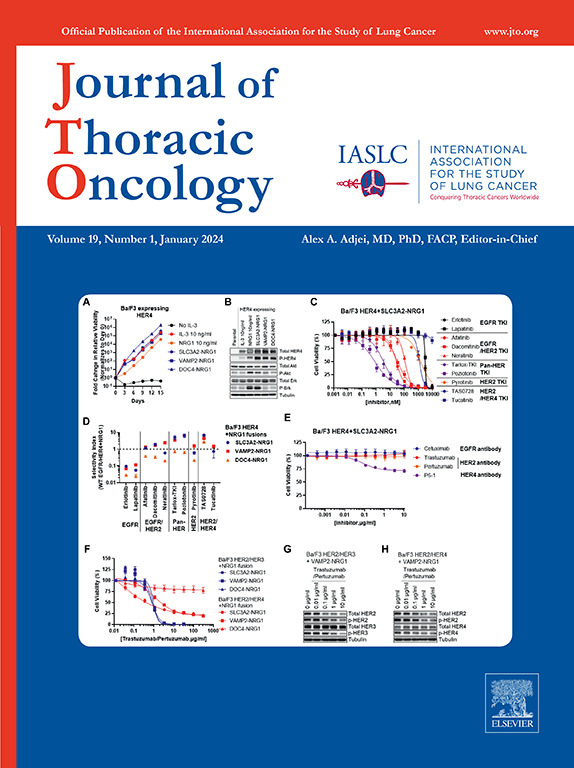Sex and Common Germline Variants Affect the Toxicity Profile and Pharmacokinetics of Alectinib: A Nationwide Cohort Study in Patients With ALK-Positive NSCLC
IF 21
1区 医学
Q1 ONCOLOGY
引用次数: 0
Abstract
Introduction
Alectinib, a small-molecule kinase inhibitor, is used as first-line treatment for ALK-positive (ALK+) NSCLC. Albeit generally well-tolerated, a considerable subset of patients requires dose adjustments due to drug-related toxicity. Single-nucleotide polymorphisms in genes related to the metabolism of alectinib may upfront identify patients at risk for toxicity.
Methods
In this multicenter observational cohort study in patients with advanced ALK+ NSCLC receiving alectinib treatment, we investigated the association between toxicity, pharmacokinetics, and key genetic variants in ABCB1, CYP3A4, PPAR-α, POR, and CYP3A5. Data on demographics, adverse events, and alectinib trough levels were collected from five hospitals.
Results
Among 215 patients, 47% experienced severe toxicity. Women experienced more severe toxicity (female versus male: 56% versus 34%; p = 0.001) and had +35% higher alectinib trough levels (p < 0.001). Homozygous carriers of the PPAR-α 209G>A variant exhibited a higher incidence of grade greater than or equal to 3 toxicity (38%) compared with patients who carried at least one wild-type allele (11%) (p = 0.004). This remained significant after Bonferroni correction. Patients who experienced severe toxicity had +18.5% (95% confidence interval: 2.9%–36.6%; p = 0.019) higher trough levels.
Conclusions
Female patients encounter more severe toxicity due to higher alectinib exposure, which warrants further exploration. PPAR-α 209G>A significantly increased relevant alectinib-induced toxicity, most likely due to an increase in alectinib exposure. Pretreatment testing for genetic variants with a subsequent dose reduction could provide a viable approach to reduce alectinib-related toxicity.
性别和常见种系变异对alk阳性非小细胞肺癌患者的毒性和药代动力学影响:一项全国性队列研究。
Alectinib是一种小分子激酶抑制剂,用于间变性淋巴瘤激酶阳性(ALK+)非小细胞肺癌(NSCLC)的一线治疗。尽管一般耐受性良好,但由于药物相关毒性,相当一部分患者需要调整剂量。与alectinib代谢相关基因的单核苷酸多态性(snp)可以预先识别有毒性风险的患者。方法:在接受阿勒替尼治疗的晚期ALK+ NSCLC患者的多中心观察队列研究中,我们研究了ABCB1、CYP3A4、PPAR-α、POR和CYP3A5的毒性、药代动力学和关键遗传变异之间的关系。从五家医院收集了人口统计学、不良事件和阿勒替尼低谷水平的数据。结果:215例患者中,47%出现严重毒性。女性经历了更严重的毒性反应(女性vs男性:56% vs 34%;p=0.001),而且与携带至少一个野生型等位基因的患者(11%)相比,pA变异的≥3级毒性发生率(38%)更高(p=0.004)。这在Bonferroni修正后仍然很重要。出现严重毒性的患者为+18.5% (95%CI: 2.9-36.6%;P =0.019)较高的低谷水平。结论:女性患者因阿勒替尼暴露量较高,毒性更严重,值得进一步探讨。PPAR-α 209G>A显著增加了相关的阿勒替尼诱导的毒性,很可能是由于阿勒替尼暴露量的增加。治疗前基因变异检测和随后的剂量减少可以提供一种可行的方法来减少阿勒替尼相关的毒性。
本文章由计算机程序翻译,如有差异,请以英文原文为准。
求助全文
约1分钟内获得全文
求助全文
来源期刊

Journal of Thoracic Oncology
医学-呼吸系统
CiteScore
36.00
自引率
3.90%
发文量
1406
审稿时长
13 days
期刊介绍:
Journal of Thoracic Oncology (JTO), the official journal of the International Association for the Study of Lung Cancer,is the primary educational and informational publication for topics relevant to the prevention, detection, diagnosis, and treatment of all thoracic malignancies.The readship includes epidemiologists, medical oncologists, radiation oncologists, thoracic surgeons, pulmonologists, radiologists, pathologists, nuclear medicine physicians, and research scientists with a special interest in thoracic oncology.
 求助内容:
求助内容: 应助结果提醒方式:
应助结果提醒方式:


